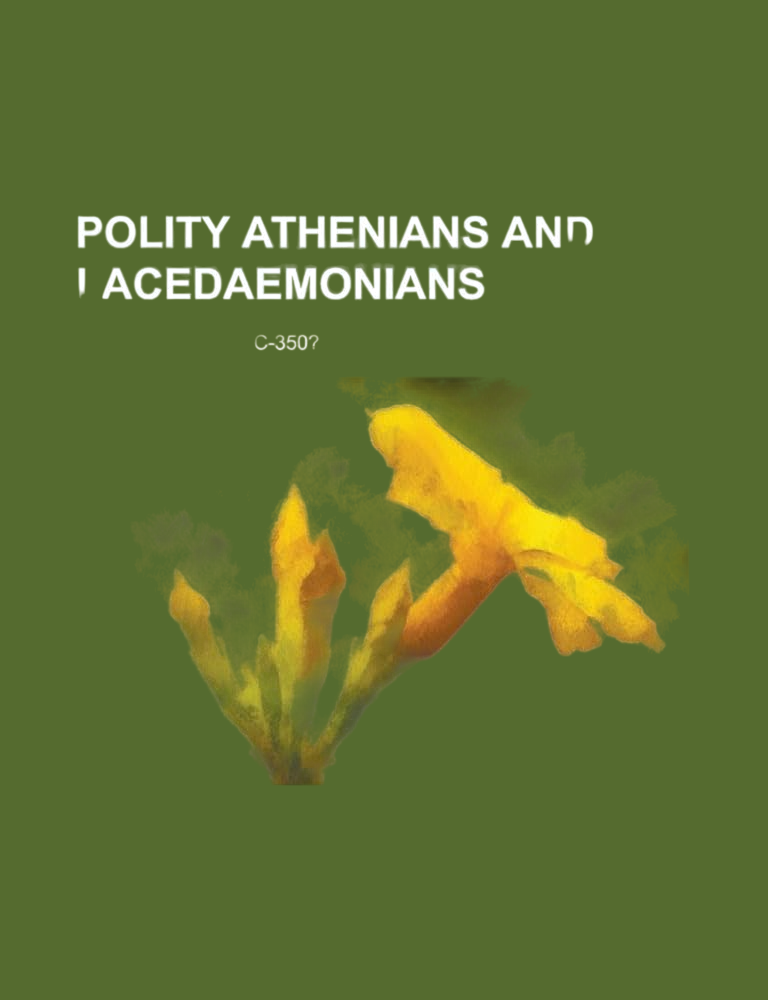
The Polity of the Athenians and the Lacedaemonians (Spartans)
By Xenophon (ca. 430 BC – 354 BCE)
Translated by H. G. Dakyns (1838 – 1911)
The Polity of the Athenians and the Lacedaemonians (Spartans) by Xenophon offers a detailed account of the political systems of Athens and Sparta, providing unique insights into their laws, institutions, and ways of life. This work is a cornerstone for understanding ancient Greek governance and societal structure.
Book Details
- Title: The Polity of the Athenians and the Lacedaemonians (Spartans)
- Author: Xenophon (ca. 430 BCE – 354 BCE)
- Translator: H. G. Dakyns (1838–1911)
- Genre: Classics (Greek & Latin Antiquity), Political Science
- Language: English
The Polity of the Athenians and the Lacedaemonians (Spartans) – Audiobook
Xenophon’s The Polity of the Athenians and the Lacedaemonians (Spartans) stands as one of the most valuable texts for understanding the political and social structures of ancient Greece. In this work, Xenophon, a prominent historian, soldier, and student of Socrates, explores the starkly contrasting systems of governance in Athens and Sparta, shedding light on their unique practices, virtues, and flaws.
The Polity of the Lacedaemonians (Spartans)
Xenophon provides an in-depth examination of the laws and institutions established by the legendary lawgiver Lycurgus. He details the Spartan way of life, from the rigorous upbringing of children to the military discipline and austere lifestyle that defined Spartan society. Through this analysis, we gain insight into how Spartans cultivated a culture of loyalty, strength, and simplicity, ensuring the city-state’s dominance in military affairs.
The Polity of the Athenians
In contrast, Xenophon presents a critical view of Athenian democracy, emphasizing its inefficiencies and vulnerabilities. His sharp commentary reflects his personal biases, shaped by his exile from Athens and his close association with Sparta. His observations offer a fascinating, albeit subjective, perspective on the strengths and weaknesses of democratic governance.
As one of the few surviving sources on Spartan society, this work remains indispensable for historians, political scientists, and enthusiasts of ancient history.
Why You Should Listen to This Audiobook
1. An Essential Historical Source
Xenophon is one of the primary sources for understanding the political and social structures of ancient Greece. His firsthand experiences as a soldier and historian lend authenticity to his accounts.
2. Contrasting Views of Governance
This work juxtaposes the democratic ideals of Athens with the oligarchic, militaristic structure of Sparta, offering timeless lessons on governance, societal values, and power dynamics.
3. Insight into Spartan Society
Without Xenophon’s writings, much of our knowledge about Spartan customs, laws, and their focus on military excellence would be lost.
4. A Unique Perspective
As an Athenian who was exiled and lived among the Spartans, Xenophon’s viewpoint is both critical and informed, providing a nuanced understanding of two iconic city-states.
5. Engaging Narration of Ancient Politics
Despite the historical nature of the text, Xenophon’s writing is accessible and engaging, making it an excellent introduction to ancient political thought and history.
About the Author
Xenophon (ca. 430 BCE – 354 BCE) was an Athenian historian, philosopher, and soldier. A pupil of Socrates, Xenophon is known for his historical works, including Anabasis, Cyropaedia, and Hellenica. His writings provide significant insights into Greek culture, military campaigns, and philosophical dialogues, making him one of antiquity’s most influential figures.
Final Thoughts
The Polity of the Athenians and the Lacedaemonians (Spartans) is a must-listen for anyone interested in ancient history, political philosophy, or governance. Xenophon’s analysis of these two iconic city-states provides timeless lessons on leadership, society, and the complexities of human nature.
Dive into this audiobook to explore the fascinating dynamics of Athenian democracy and Spartan discipline through the eyes of one of history’s most insightful chroniclers.









